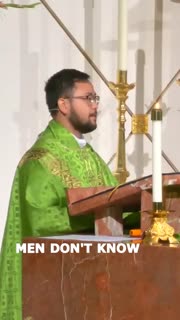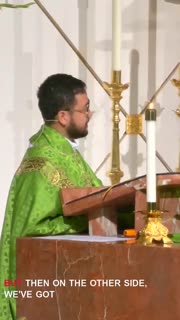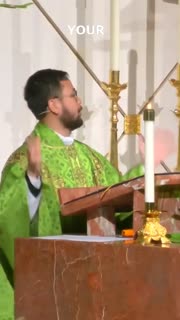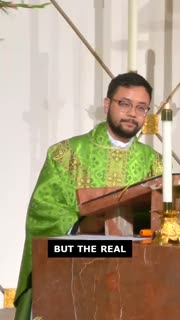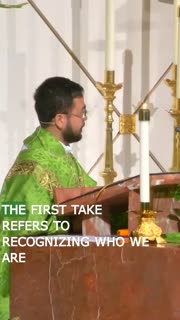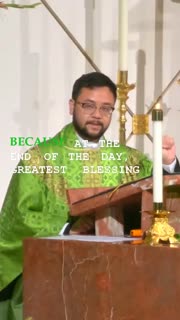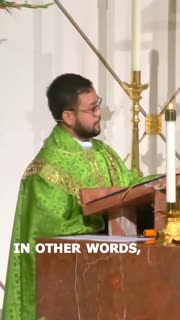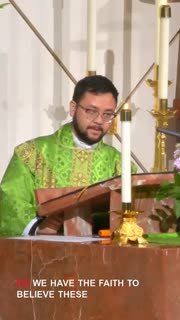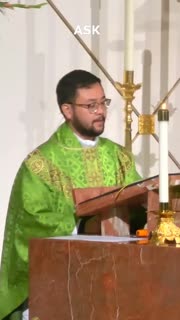Authentic Masculinity: Embracing Wisdom and Divine Justice
Devotional
Sermon Summary
Bible Study Guide
Sermon Clips
1. "Men don't know how to be men anymore. Men don't know how to be men anymore. To me, it feels like I've heard that constantly for close to a decade now. Men don't know how to be men anymore. And I hear it from two warring factions. On one side, we've got 2017's hashtag me too. Now, please don't misunderstand me. If you feel like you've been abused or have been harassed, my office is a safe place. You and I can figure it out together and try to figure out our next steps as best as we can." [20:37] (41 seconds)
2. "But then on the other side, we've got what's known as the red pill manosphere. And it's really a response. To the fallout of 2017. The red pill for you zoomers and gen alphas out there is a matrix reference. And it refers to an awakening of a difficult but hidden reality. And manosphere describes this space, this community online, as a so-called safe space for men to be themselves and learn how to be real men. But does it propose an authentic masculinity? My take is no." [21:43] (45 seconds)
3. "So your homework for today is to go and read the rest of Proverbs chapter 9. the rest of Proverbs chapter 9, just to give you a summary, contrasts wisdom's house, wisdom's banquet, with the woman of folly. Lady folly has also prepared a banquet to invite people over. But she's the antithesis to wisdom. Where wisdom has built her own house, folly lives in the city heights, implying that she's the inheritance kind of wealthy." [24:25] (38 seconds)
4. "But the real foil, the real alternative in presenting an authentic masculinity, is none other than our Lord Jesus Christ. These last few weeks you and I have journeyed through and explored John chapter 6, with today being our second to last installment. And if you need more detailed refreshers, visit our website, follow our podcast, and give my homilies another listen. But in summary, we've presented God as the one who hands, hand feeds us, and that what's actually in the hand of God is nothing but a nail hole." [25:24] (46 seconds)
5. "The first take refers to recognizing who we are now, with all of our gifts, all of our talents, but even our shortcomings and sins. Recognizing all those things, but then making the effort to be better Christian men and women, to be more virtuous men and women. But we have to do this with eyes raised to heaven, because we know we cannot succeed in that effort unless we ask for God's help, God's grace. And we receive that grace to persevere, first and foremost from the Eucharist, which actually means Thanksgiving." [27:55] (49 seconds)
6. "Because at the end of the day, greatest blessing we can bestow is the free and generous and total gift of ourselves, our very lives. Just as Jesus Christ was broken and will be broken in the Eucharist to give that gift to us, so too are we called to experience some hardship, some breaking of ourselves, in order to train us in that level of generosity. And it's at that point, and only at that point, can we dare to utter the words of Christ to others. Take and eat. This is my body, given for you." [29:32] (55 seconds)
7. "In other words, when we receive the most holy Eucharist worthily, we become what we receive. We become Eucharistic people. We become the body of Christ, broken in love for others. And so the command is to be what you see when the priest or the extraordinary minister of Holy Communion presents the host to you. what you see. Receive who you are. And note that authentic masculinity is encapsulated in that tiny host. Authentic masculinity is encapsulated in that tiny host." [30:14] (54 seconds)
8. "Do we have the faith to believe these things about something that looks like bread, that tastes like bread? Do we have the hope to believe that everything we need to be to be the best sons and daughters of God that he's calling us to be can be found in that wafer? And do we have the love not only to love and to adore that wafer, but to invite people and to bring people to this banquet that the divine wisdom has prepared for all of us?" [31:51] (44 seconds)
9. "Let's therefore today ask for that grace to be authentic men and women, to be apostolic men and women, to be eucharistic men and women. In the name of the Father and of the Son and of the Holy Spirit. Things visible and invisible, I believe in one Lord Jesus Christ, the only begotten, the resurrection of the dead. Father gives us his own Son as real food and real drink at the altar. We can ask him for all our needs through Christ, the source of new life." [32:40] (60 seconds)
Ask a question about this sermon
2. "But then on the other side, we've got what's known as the red pill manosphere. And it's really a response. To the fallout of 2017. The red pill for you zoomers and gen alphas out there is a matrix reference. And it refers to an awakening of a difficult but hidden reality. And manosphere describes this space, this community online, as a so-called safe space for men to be themselves and learn how to be real men. But does it propose an authentic masculinity? My take is no." [21:43] (45 seconds)
3. "So your homework for today is to go and read the rest of Proverbs chapter 9. the rest of Proverbs chapter 9, just to give you a summary, contrasts wisdom's house, wisdom's banquet, with the woman of folly. Lady folly has also prepared a banquet to invite people over. But she's the antithesis to wisdom. Where wisdom has built her own house, folly lives in the city heights, implying that she's the inheritance kind of wealthy." [24:25] (38 seconds)
4. "But the real foil, the real alternative in presenting an authentic masculinity, is none other than our Lord Jesus Christ. These last few weeks you and I have journeyed through and explored John chapter 6, with today being our second to last installment. And if you need more detailed refreshers, visit our website, follow our podcast, and give my homilies another listen. But in summary, we've presented God as the one who hands, hand feeds us, and that what's actually in the hand of God is nothing but a nail hole." [25:24] (46 seconds)
5. "The first take refers to recognizing who we are now, with all of our gifts, all of our talents, but even our shortcomings and sins. Recognizing all those things, but then making the effort to be better Christian men and women, to be more virtuous men and women. But we have to do this with eyes raised to heaven, because we know we cannot succeed in that effort unless we ask for God's help, God's grace. And we receive that grace to persevere, first and foremost from the Eucharist, which actually means Thanksgiving." [27:55] (49 seconds)
6. "Because at the end of the day, greatest blessing we can bestow is the free and generous and total gift of ourselves, our very lives. Just as Jesus Christ was broken and will be broken in the Eucharist to give that gift to us, so too are we called to experience some hardship, some breaking of ourselves, in order to train us in that level of generosity. And it's at that point, and only at that point, can we dare to utter the words of Christ to others. Take and eat. This is my body, given for you." [29:32] (55 seconds)
7. "In other words, when we receive the most holy Eucharist worthily, we become what we receive. We become Eucharistic people. We become the body of Christ, broken in love for others. And so the command is to be what you see when the priest or the extraordinary minister of Holy Communion presents the host to you. what you see. Receive who you are. And note that authentic masculinity is encapsulated in that tiny host. Authentic masculinity is encapsulated in that tiny host." [30:14] (54 seconds)
8. "Do we have the faith to believe these things about something that looks like bread, that tastes like bread? Do we have the hope to believe that everything we need to be to be the best sons and daughters of God that he's calling us to be can be found in that wafer? And do we have the love not only to love and to adore that wafer, but to invite people and to bring people to this banquet that the divine wisdom has prepared for all of us?" [31:51] (44 seconds)
9. "Let's therefore today ask for that grace to be authentic men and women, to be apostolic men and women, to be eucharistic men and women. In the name of the Father and of the Son and of the Holy Spirit. Things visible and invisible, I believe in one Lord Jesus Christ, the only begotten, the resurrection of the dead. Father gives us his own Son as real food and real drink at the altar. We can ask him for all our needs through Christ, the source of new life." [32:40] (60 seconds)
